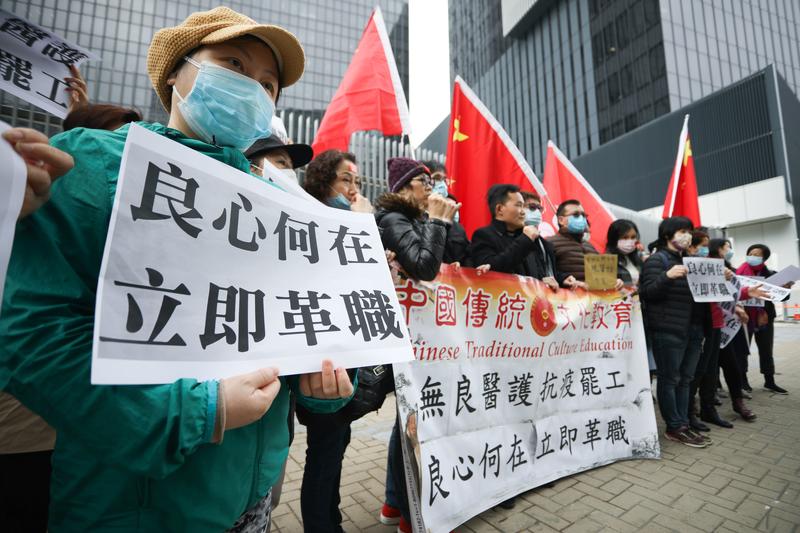 Residents rally outside the Central Government Offices in Admiralty on Monday. They condemned medical workers on strike during the fight against novel coronavirus pneumonia and called for them to be punished. (CALVIN NG / CHINA DAILY)
Residents rally outside the Central Government Offices in Admiralty on Monday. They condemned medical workers on strike during the fight against novel coronavirus pneumonia and called for them to be punished. (CALVIN NG / CHINA DAILY)
When answering a call from the Hospital Authority to help out at the accident and emergency (A&E) unit of a public hospital, Kelvin Wong Kiu-fung did not expect the mission would become so much more challenging when thousands of hospital workers went on strike.
The industrial action added a tremendous burden to public hospitals, which were already facing an acute staff shortage due to the new coronavirus epidemic. The strike ran for five days, until the majority of members of the new union that called the strike then voted on Friday to call it off. The strikers had called for a total lockdown of the city - a demand the government rejected.
As long as there is protective gear and other resources, medical workers have no reason to shirk their responsibilities to the patients
Kelvin Wong Kiu-fung, a front-line medical worker
Emergency services were among those affected by the strike. On the first day of the strike, more than 100 A&E medical workers were absent. The extra workload fell on those workers, including Wong, who remained at their posts.
ALSO READ: Biotech company to donate testing kits
As a volunteer, Wong was expected to work an average of three hours a day at A&E after his normal shift in the Department of Surgery at North District Hospital. Burdened with an extra workload during the strike, Wong could sense anxiety rising among all remaining front-line medical employees.
“You never know whether the next patient you receive is coronavirus-positive or not,” Wong said. He said most patients at A&E early this month showed pneumonic symptoms. The North District Hospital, which Wong works for, has received a 58-year-old patient who was later confirmed to have been infected with the virus.
All front-line medical workers are fully geared up as the virus spreads from person to person in close proximity through droplets of bodily fluids, such as saliva or mucus, or through personal contact. The head-to-toe protective gear creates another level of anxiety for the front-line workers.
“When you put on the gear, you face the possibility of receiving an infected patient. When you take it off, you face the risk of being infected for accidentally touching the gear but forgetting to wash your hands afterward,” Wong said.
Front-line medical workers need to wash their hands after taking off their protective gear. Wong said gloves are normally the first to be taken off, while face masks, goggles and hoods come off last. The whole procedure takes 15 to 20 minutes.
“You have to be extremely attentive when you take off your gear. You need to keep asking yourself, ‘Have I done it in the right order?’ or ‘Have I washed my hands?’ That certainly places an immense mental pressure on front-line workers,” Wong said.
But to Wong, the anxiety seldom stems from worrying about the shortage of medical resources, a concern cited by many medical workers who went on strike. They fear that the shortage of protective gear will expose them to the deadly disease that has infected at least 42 people in Hong Kong.
The Hospital Authority had about 16 million surgical masks and around 2.2 million protective suits as of Monday.
Briefing the media on Saturday, Hong Kong Chief Executive Carrie Lam Cheng Yuet-ngor said the government’s stock of face masks, sufficient for one month, will be distributed first to front-line personnel, including medical workers, while more masks from the mainland and overseas suppliers are on the way.
“As long as there is protective gear and other resources, medical workers have no reason to shirk their responsibilities to the patients,” Wong said.
Though lashing out at the government for being several steps behind in containing the epidemic, Wong said that medical employees could adopt a more positive and proactive attitude and negotiate with the government on tightening border checks, instead of taking the extreme step of abandoning their patients.
In Wong’s view, being positive, united and faithful is the key to facing up to the fear of an epidemic outbreak. He has launched an online campaign to call on all people, regardless of their jobs and politics, to join together to fight and win the battle against the coronavirus.
Wong noted that the majority of the thousands of signatures and messages received are positive, conveying confidence in and support for Hong Kong. Difficulties could be overcome with love and wisdom, Wong said, citing the success on the mainland.
READ MORE: 'Not in my backyard' protests alarm experts
The virus has infected over 40,000 people on the mainland. Thousands of medical workers have volunteered to join the fight in Wuhan, the epicenter of the outbreak.
“Mainland medical professionals have demonstrated their professionalism and selflessness. They brought relief to the local people, and set an example to people across the country that fear can be conquered by confidence,” Wong said.
Wong said he will continue his volunteer work at A&E. “It’s nothing big, but a duty I should fulfill,” he said.


